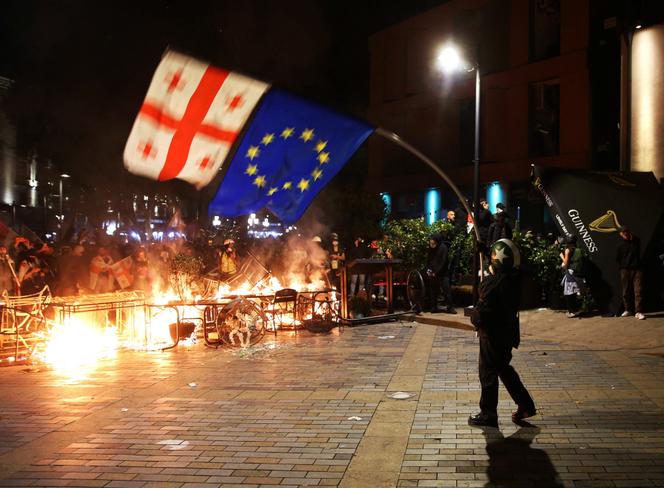


Georgian police on Saturday, October 4, fired tear gas at anti-government protesters who tried to enter the presidential palace, as tens of thousands rallied on local elections day after the opposition urged a "last chance" protest to save democracy." The ruling, populist Georgian Dream party is facing its first electoral test since a disputed parliamentary poll a year ago plunged the Black Sea nation into turmoil and froze prospects for closer integration with the European Union.
Ahead of the demonstration, authorities pledged a tough response to those it cast as seeking "revolution." Waving Georgian and EU flags, tens of thousands flooded Tbilisi's Freedom Square for what organisers dubbed a "national assembly," seeking a peaceful transfer of power from the ruling Georgian Dream party, an Agence France-Presse (AFP) reporter observed.
The typically low-key local elections have acquired high stakes after months of raids on independent media, the introduction of laws restricting civil society and the jailing of dozens of opponents and activists.
Opera star-turned-activist Paata Burchuladze attended the Freedom Square demonstration to read out – to loud applause – a declaration claiming "power returns to the people," branding the government "illegitimate" and announcing a transition. Demonstrators then marched toward the presidential palace and tried to enter the compound, prompting riot police to fire tear gas. The interior ministry said the rally "exceeded the norms set by the law."
"Anyone who cares about Georgia's fate should be out here today," 77-year-old protester Natela Gvakharia told AFP. "We are here to protect our democracy, which Georgian Dream is destroying."
Imprisoned reformist ex-president Mikheil Saakashvili had urged supporters to protest on election day for what he called the "last chance" to save Georgian democracy. "There are moments when action is needed here and now," he wrote on Facebook on Thursday. "Freedom – now or never!" Without action, "many more people will be arrested and the rest driven out," he warned. "Total hopelessness will take hold and the West will finally give up on us."
Prime Minister Irakli Kobakhidze said plans for a "revolution" are doomed to fail, accusing organizers of "radicalism" and threatening "many may find themselves behind bars." Rights groups say some 60 people – among them key opposition figures, journalists and activists – have been jailed over the past year.
Amnesty International said the elections were "taking place amid severe political reprisals against opposition figures and civil society." "With opposition leaders jailed and civil society organisations under attack... people's rights to freedom of expression, association and peaceful assembly are being crushed," it said.
Georgian Dream has been in power since 2012. It is controlled by billionaire former prime minister Bidzina Ivanishvili, who voted in Tbilisi early on Saturday morning, surrounded by cameras.
The party initially presented itself as a liberal alternative to Saakashvili's reformist camp. But since Russia's full-scale invasion of Ukraine in 2022, critics say it has tilted toward Moscow, pursuing far-right policies and adopting Kremlin-style measures targeting independent media and NGOs.
Georgian Dream – which has threatened to ban all major opposition parties – rejects these accusations. It says it is safeguarding "stability" in the country of four million while a Western "deep state" seeks to drag Georgia into the war in Ukraine with the help of opposition parties.
Analysts say Georgian Dream's blunt pitch – claiming that the opposition wants war, but it wants peace – resonates in rural areas and is amplified by disinformation. A recent survey by the Institute of Social Studies and Analysis found the party's approval rating at approximately 36%, compared to 54% for opposition groups.
The European Union has sanctioned several Georgian Dream party officials over previous crackdowns on protestors. It has also warned it could suspend Georgians' right to visa-free travel to the EU unless the government improves the rule of law and commits to protecting fundamental rights.
